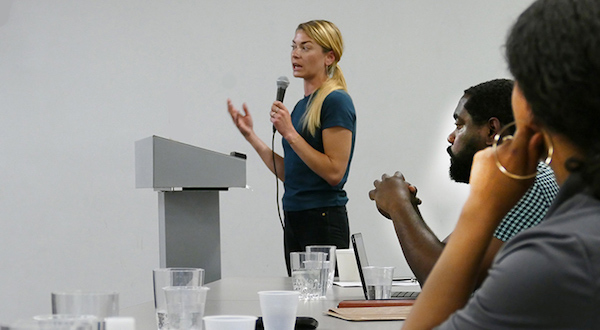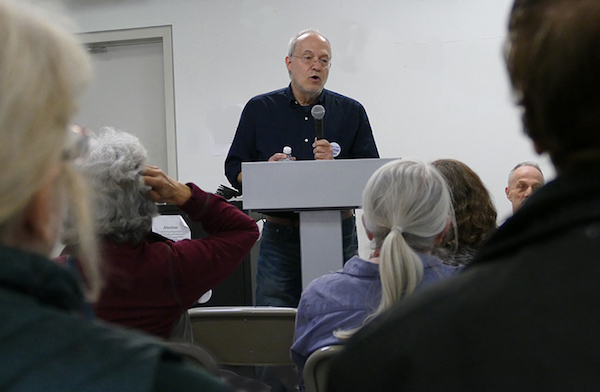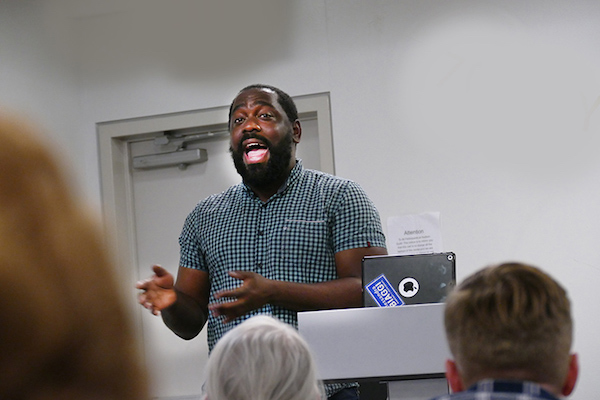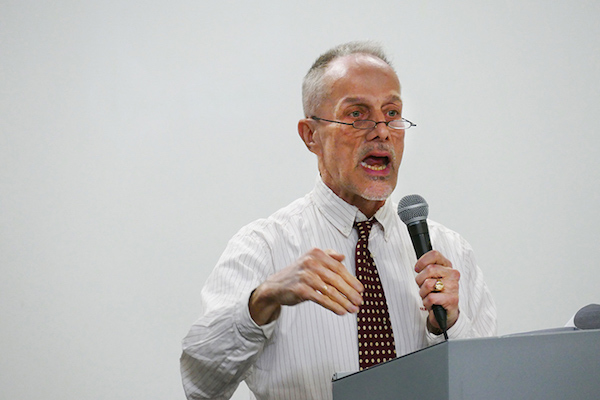
BY DONATHAN SALKALN | Frontline advocates for statewide reform in the areas of criminal justice, election law, education, campaign finance, and healthcare reported on their Albany wins and losses, at the May 16 general meeting of the Chelsea Reform Democratic Club (CRDC), held at the Hudson Guild Elliott Center.
With a newly elected Democratic majority in the NY State Senate joining a Democratic Assembly and Democratic Governor, there was much optimism in Albany that many progressive reforms would be included in this year’s budget. The panel of battle-worn warriors, taking a break from Albany, was organized by Co-Program Director Mindy Rosier-Rayburn.
CRIMINAL JUSTICE: Erin George, Criminal Justice Campaigns Director at Citizen Action of New York reported, “This year in Albany, we passed the most progressive criminal justice package of reform in the country!” She went on to explain that the tragic story of Kalief Browder, a teen who committed suicide after being incarcerated for three years at Rikers Island, without a trial for allegedly stealing a backpack as “not an exception, but the rule!”
PROGRESSIVE REFORMS: Pre-trial Justice System: Currently New York is one of only four U.S. states that has a closed file discovery model, which means that individuals are not entitled to the vast majority of evidence against them until just before the trial. This coming January, people are going to be entitled to all case information 15 days after arraignment. “I heard some of the folks in the defender’s offices were crying with tears of joy, because of how it will balance the scales of justice,” George told the group.
Money Bail Reform: “We were demanding the end to money bail because race and wealth should not determine incarceration. We eliminated money-bail for the vast majority of misdemeanors, non-violent felony charges and lower-level violent felony charges,” George declared. “Jails across the state are going to shrink. It will force us, as a society, to stop using jails as a social safety net. We are going to have to fund the real solutions, which are education, healthcare, substance abuse support, and housing.”

ELECTION LAWS: George Albro, Co-Chair, New York Progressive Action Network, informed the group that New York had the worst voting laws in the country. “The State sets a ridiculous 335-day deadline to enroll in political parties before each general election. Most states have 25 days to 60 days to change parties,” Albro complained, adding, “Twenty-five percent of registered voters are independents and can’t vote in primaries. In 2016’s presidential primary election millions of people, who actually wanted to vote, couldn’t because they weren’t registered Democrats. They were sent home.” Albert continued: “In order to vote in New York’s primary on April 28th of next year, voters will need to register for a party by October 11.” Albro also warned of a new independent commission formed by Governor Cuomo that will consider doing away with fusion voting. “The Governor has a big thing against the Working Families Party because they are independent of him.” Albro said that eliminating fusion voting would be challenged in court.
PROGRESSIVE REFORMS: Early Voting: A nine-day early-voting measure was approved. “It will include two weekends. Unfortunately the Board of Elections is not making it voter friendly,” Albro pointed out. “They’re having very few polling sites. We’re having a fight with them to make it more the way it was intended.”
Same Day Registration to vote in the general election was approved.
Registering On-Line: Starting in 2021, NYS citizens will be able to register online. Currently, people can fill out a form online, print it, sign it, and mail it in.

EDUCATION: Maria Bautista, Campaigns Director of Alliance for Quality Education—livid that New York State under Democratic control included an increase of $618 million to high-need school districts in the 2020 budget—reminding the assembled group that that was the same increase obtained by a Republican-controlled Senate the year before. Bautista repeatedly referred to a Campaign for Fiscal Equality law suit brought by Community School Board President Robert Jackson in 1993 (Robert Jackson is now a NY State Senator representing Elliott Houses), and enacted in 2006, requiring the state to provide an additional $4.7 billion in operating aid yearly, and $9.2 billion in capital funding to underserved school districts. While the legislature complied with capital funding, it has yet to earmark the needed annual money to fully fund needy school districts across the State and City. “Cuomo has been receiving top dollars from charter school supporters and has continually blocked the Campaign For Fiscal Equity money.” Bautista noted. “We’re owed over $4 billion across the state, and NYC schools are owed $1.4 billion!”
PROGRESSIVE REFORMS: Dream Act was earmarked $27 million, which will allow undocumented immigrants to access a pool of resources to be able to go to college.
Statewide Pre-K: $15 millions dollars of newly earmarked money toward statewide Pre-K education. Bautista said $45 million is needed.
FUTURE INITIATIVES
Safe and Supportive School Act: “Black and brown students are suspended from school 3 times, 4 times their white counterparts. This legislation would eliminate suspensions from K-3rd grade across the state,” said Bautista. “It would hold school districts accountable to school codes of conduct and mandate racial justice. Right now we are pushing them out of our schools and into our jails.”
Culturally Responsive Education Bill: “In New York City, 7% of students are black and brown while 60% of teachers are white. This is problematic,” Bautista pointed out. “The curriculum doesn’t reflect our children at all.” The bill would require teachers to be certified in culturally responsive education for grades K-12.

CAMPAIGN FINANCE: Stanley Fritz, Campaigns Manager of Citizen Action of New York, reported on efforts to get a statewide, publicly financed campaign system. It would allow anybody to run for office and receive public dollars with a 6:1 matching ratio without having to reach out to Airbnb, Uber, Success Academy or other groups, which have their own agendas. “We already have this in New York City,” Fritz said, “and it’s been going so well that instead of doing a 6:1, match we’ve increased it to an 8:1 match, meaning for every dollar you give to somebody running for office, the city puts up eight dollars.”
PROGRESSIVE REFORMS “By 2020, we have a $100 million earmarked for a statewide publicly financed campaign system 6:1 match. How it will be implemented will be decided through a commission of nine unelected people,” Fritz noted, explaining that the Governor, State Senate and State Assembly, will pick the members. “This bill will transform the way we do business in Albany.”

HEALTHCARE: Mark Hannay, Executive Director, Metro New York Health Care for All, informed the group that New York has one of the best Medicaid and child health programs, and one of the most robust implementations of the Affordable Health Care Act. “Our uninsured rate is down less than five percent and less than two percent of kids that are uninsured now. All that said, insurance premiums and out of pocket costs are high and the networks are really narrow. We’ve got work to do.”
PROGRESSIVE REFORMS: All provisions of the Affordable Care Act were codified into law to protect them from being undermined by President Trump. Also, there’s now a commission set up that will help determine staffing levels need to exist in hospitals and nursing homes. Mental health parity programs and substance treatment programs were adopted in the budget.
FUTURE INITIATIVES: “We need to move the New York Health Act forward. For the first time ever, there will be a joint a hearing on the bill between the Assembly and the Senate,” Hannay explained. Other measures fought for but not in the budget were plans to expand public options for undocumented immigrants, and also include working poor people just above the Medicaid level into NYS’s Essential Plan.
An important issue that advocates chose not to address at the meeting is the fiscal reality of New York State’s budget of $175 billion facing a projected deficit in excess of $2 billion, due to a loss of tax receipts. In a CBS story earlier this year, Governor Cuomo blamed the deficit on the recent federal law capping a deduction for state and local taxes known as SALT. Republicans, now in the minority in the New York State Senate as well as the Assembly, said New York’s high taxes were already prompting people to move to other states before the federal tax reforms kicked in. No matter the reason, the pie is projected to shrink, which means that many of the slices of the pie that finance existing programs across the state might need to get smaller.
NOTE: This article first appeared on the website of the Chelsea Reform Democratic Club and appears here, with the author’s blessing.
Chelsea Community News is made possible with the help of our awesome advertisers, and the support of our readers. If you like what you see, please consider taking part in our GoFundMe fundraiser (click here). To make a direct donation and/or send feedback about the site, send an email to Scott@chelseacommunitynews.com.

Pingback: Nexus Market Exit Scam
Pingback: ติดเน็ต ais
Pingback: bdsm videos
Pingback: ตรวจสอบบัญชี ภูเก็ต
Pingback: SSI Divemaster Koh tao
Pingback: Simpleplay
Pingback: กำจัดปลวก สงขลา
Pingback: สล็อต เครดิตฟรี
Pingback: Morpheus8 รีวิว
Pingback: Saba sport เดิมพันกีฬาเสมือนจริง
Pingback: fake information
Pingback: ร้านสักปาก สีลม
Pingback: โอลี่แฟนxxx
Pingback: poolvilla pattaya
Pingback: psilocybe azurescens cyanescens difference
Pingback: หวยออนไลน์
Pingback: 뉴토끼
Pingback: briansclub
Pingback: สล็อตเว็บตรง แตกง่าย
Pingback: hop over to this website
Pingback: denver mushroom dispensary
Pingback: buy remingtonarms
Pingback: sbobet
Pingback: sbobet
Pingback: ขายเฟสบุ๊คยิงแอด
Pingback: maxbet
Pingback: สล็อตวอเลท ไม่มีขั้นต่ำ
Pingback: sbo
Pingback: nova88
Pingback: resource
Pingback: scooter rental in honolulu
Pingback: Ammunition for sale online
Pingback: Vanessa Getty wiki
Pingback: card dump sites
Pingback: junk removal near me
Pingback: good dumps
Pingback: Supercritical CO2 Extraction Machine